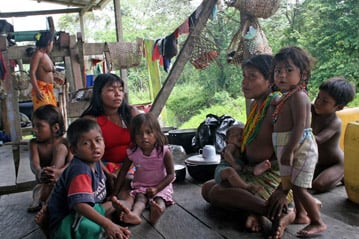Forced displacement devastating Colombia's indigenous people
Forced displacement devastating Colombia's indigenous people
On the eve of tomorrow's (Saturday) International Day of the World's Indigenous Peoples, UNHCR is drawing attention to the plight of indigenous groups at risk of violence and forced displacement in Colombia.
There are around a million indigenous people in Colombia, belonging to more than 80 different Indian-American groups with over 60 separate languages. Nearly all of these groups have been victims of forced displacement or are threatened by it as a result of the internal armed conflict. According to Colombia's national indigenous association, ONIC, 18 of the smaller groups are at risk of disappearing altogether.
Every year, an average of between 10,000 and 20,000 indigenous people are registered by national authorities after being forced to flee from their lands. ONIC estimates the numbers could be far greater, since many indigenous people do not have access to registration - either because of the remoteness of their lands or because they do not speak Spanish and are not familiar with the national registration system.
The figures give only a partial glimpse of the devastating impact forced displacement is having on Colombia's indigenous communities, whose economic, social and cultural survival depends on their very strong links with their ancestral land. In many cases, losing their territory and moving into the entirely foreign environment of the cities threatens the very survival of the group and its individual members.
But while forced displacement often is a tragedy, it is also a fundamental right. UNHCR is very concerned about the fate of several indigenous communities living in situations of confinement or semi-confinement. This has been the case this year with the Awá community in the Nariño region in the south, the Nukak and Guyabero Indians in the Guaviare region, and of several groups in the Pacific region of Chocó.
UNHCR supports indigenous communities in high-risk areas of Colombia and assists them in rebuilding their lives when they are forcibly displaced. Our intervention ranges from "protection by presence" in conflict zones to documentation campaigns as well as education and health projects. In all cases, we work in a collaborative approach that seeks to increase the participation of the community and in coordination with our partners and the Colombian government.
UNHCR also assists indigenous refugees in neighbouring countries such as Panama, Ecuador, Venezuela and Brazil, under a regional strategy to better address the specific needs of indigenous people during exile.






